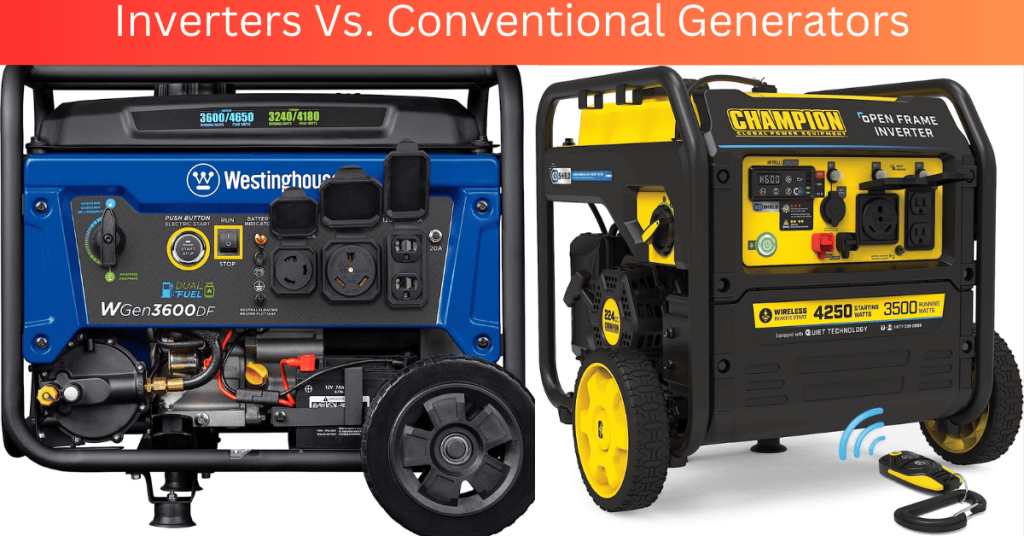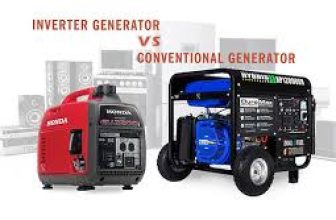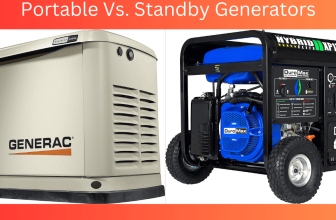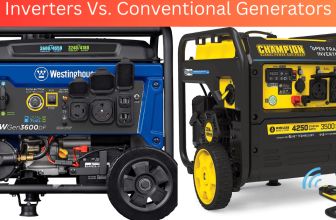A Comparative Study: Inverter Generators Vs. Conventional Generators
Generators are a vital source of power for many of us, allowing us to access electricity when the grid fails. But with so many types of generators on the market, how do we know which one is right for us?
In this article, we’re going to compare two popular types of generator: inverter generators and conventional generators. We’ll explore the pros and cons of each type so that you can make an informed decision about which one will best meet your needs.
So let’s get started!

What Is An Inverter Generator?
I’m sure you’ve heard of generators, but have you ever heard of an inverter generator? Well, let me tell you what it is.
An inverter generator is a type of portable generator that uses advanced electronic technology to produce a cleaner and more consistent power supply than traditional generators. It’s equipped with an inverter, which performs the process of converting direct current (DC) into alternating current (AC). This makes it suitable for powering sensitive electronic devices like laptops and phones.
Inverter generators are designed to be quieter, more fuel efficient, and lighter in weight than their conventional counterparts. They generate less noise and vibration, making them ideal for use in campsites or other outdoor activities where noise can be a problem. Additionally, they consume less fuel due to their lower engine speeds when under load. Finally, because of their smaller size and lighter weight design, they’re also much easier to transport from one place to another.
The advantages of an inverter generator make it a great choice for anyone looking for a portable generator that provides reliable power output without taking up too much space or being too loud. With its impressive features and qualities, it’s no surprise that this type of generator has become increasingly popular over the years.
Now that you know what an inverter generator is, let’s take a look at what a conventional generator is all about.
What Is A Conventional Generator?
I’m sure you’ve seen conventional generators before – they’re the big, noisy machines that most of us associate with power outages or camping trips. But what exactly is a conventional generator? Let’s take a look at the difference between these two types of generators.
To understand what makes a conventional generator unique, let’s compare it to an inverter generator in this chart:
| Inverter Generator | Conventional Generator |
|---|---|
| Quieter operation | Louder operation |
| More efficient | Less efficient |
| Can regulate power output | Cannot regulate power output |
| More expensive | Cheaper |
As you can see, conventional generators are louder and less efficient than their inverter counterparts. They also tend to be cheaper, but lack the ability to regulate power output. This gives them a disadvantage when it comes to powering sensitive electronics like laptops or cell phones. On the other hand, they do have their uses and can still provide reliable power in certain scenarios.
Now that we’ve established what a conventional generator is, let’s take a look at the advantages of using an inverter generator.
Benefits Of An Inverter Generator
The conventional generator has been around for a long time and is still used today in many applications. It’s a reliable and affordable way to generate power when needed. However, some of the drawbacks of these generators are noise, emissions, and fuel inefficiency.
Inverter generators offer an alternative solution that provides several benefits over traditional units. These generators are quieter, produce fewer emissions, and use fuel more efficiently than their conventional counterparts. In addition, inverter generators are often lighter and more portable than traditional models, making them easy to take with you on camping trips or other outdoor activities.
Inverter generators also have the ability to produce clean power for sensitive electronic devices like computers or phones. This makes them great for use on construction sites where there is a need for both power tools and electronic devices at the same time. The ability to use both types of equipment without damaging either one is invaluable in this type of work environment.
With all these advantages, it’s no wonder why so many people choose inverter generators over conventional ones.
The next section will focus on exploring the benefits of a conventional generator – from cost savings to larger wattage outputs – as well as some of the drawbacks that come with it.
Benefits Of A Conventional Generator
Conventional generators offer a number of advantages that make them an attractive choice for many people.
Firstly, their size and weight makes them easy to transport and store. Because they are smaller than inverter generators, they don’t require as much physical effort to move around.
Secondly, conventional generators have a lower upfront cost than inverter generators. This allows people who may not have a large budget to still be able to purchase one without breaking the bank.
Finally, conventional generators can produce more power than inverter generators. This makes them ideal for powering larger equipment such as air conditioners or refrigerators.
Given these benefits, it’s no wonder why so many people choose conventional generators over inverter models. With the right model and fuel type chosen, conventional generators can be just as reliable and efficient as their more modern counterparts.
In addition, the cost savings associated with purchasing a conventional generator can be substantial when compared to an inverter generator of similar power output.
It’s clear that there is a lot going in favor of choosing a conventional generator over an inverter one – but what about price?
Inverter Generators Vs Conventional Generators: Price
When it comes to the cost of investing in a generator, there’s quite a bit of disparity between inverter and conventional generators. On one hand, you’ve got the traditional model – which is typically much cheaper than its modern counterpart. On the other, you have the inverter generator – which can cost significantly more. So how do you decide which one is worth investing in? Let’s explore the differences between these two options and see what makes them so unique.
Conventional generators are often much more affordable up-front, but they come with their fair share of drawbacks. For starters, they’re usually noisier than inverter generators, making them impractical for use in residential areas or areas where noise pollution is an issue.
They also lack fuel efficiency – meaning they tend to burn through fuel much faster than their inverter counterparts – and can be difficult to maintain over time due to their limited features.
Inverters are more expensive upon purchase, but they make up for it with superior fuel efficiency and low noise levels. As such, these models are popular among campers and RVers who need reliable power on-the-go without generating too much noise.
Additionally, inverters come with advanced safety features that make them an ideal choice for home use or any environment where safety is a top priority. These features help protect your investment by preventing damage from overloads or low oil levels during operation.
In short, when choosing between an inverter and conventional generator, you have to weigh out your needs versus your budget and choose what works best for you. If price is a major factor then a conventional generator might be the way to go; however if noise level or safety are important considerations then an inverter generator should be given serious consideration before making a final decision.
With that being said, let’s take a look at how weight factors into this equation…
Inverter Generators Vs Conventional Generators: Weight
Weighing up the differences between inverter generators and conventional generators is an important consideration.
In terms of weight, there’s a big difference between them. If you’re looking for something lightweight and portable, an inverter generator might be the way to go.
Inverter generators tend to be much lighter than conventional generators. They are usually sized to fit in your hand or on your shoulder, making them ideal for camping trips or if you need something that can easily move from one place to another.
On average, inverter generators weigh about 25-50 pounds, depending on the model you choose.
Conventional generators are typically much heavier than their inverter counterparts – usually ranging from 50-100 pounds or more.
While this makes them less suitable for carrying around with you, it does mean that they have more power and can generate a higher wattage output than smaller models. With their added bulk comes greater stability and noise reduction too.
Inverter Generators Vs Conventional Generators: Portability
When it comes to portability, inverter generators are the clear winner. They’re significantly lighter than conventional generators, making them much easier to transport. Some models weigh as little as 33 lbs., while conventional generators can weigh up to 100 lbs. or more.
This makes them perfect for anyone who needs to take their generator on the go, such as campers or tailgaters. Inverter generators also take up a fraction of the space of conventional generators. Many models are designed with built-in handles and wheels, so you can easily move them around without any help.
They’re also surprisingly quiet – some modern designs can produce as little as 53 decibels at full load, which is barely louder than a normal conversation. All in all, inverter generators offer far superior portability compared to conventional generators. They’re light enough that you can lift and move them yourself, yet powerful enough to get the job done when you need it most.
Plus, they don’t make nearly as much noise when running – an important consideration for anyone who wants to be respectful of their neighbors or fellow campers! With all these advantages combined, it’s no wonder why inverter generators are becoming increasingly popular among those who need reliable power on the go.
Moving on from portability, let’s look at how inverter generators and conventional generators compare when it comes to power output.
Inverter Generators Vs Conventional Generators: Power Output
First, let’s look at the power output of inverter generators versus conventional generators. Inverter generators are generally much more efficient when it comes to producing power. Their internal components are designed to convert AC current into DC current, and then back into AC current with minimal losses in efficiency. This means their power output is much more consistent, and they can produce electricity that is suitable for sensitive electronics like laptops and phones.
Conventional generators have a much less efficient design when it comes to producing power. They use mechanical parts to produce electricity, which results in higher energy losses and inconsistent power output. Additionally, the voltage produced by conventional generators fluctuates greatly, making them unsuitable for use with sensitive electronics.
In comparison to inverter generators, conventional generators are not as effective at producing consistent high-quality power. This makes them better suited for powering tools and appliances that don’t require clean energy sources like air conditioners or refrigerators.
With these limitations in mind, we can now move on to explore how inverter and conventional generators compare in terms of fuel efficiency.
Inverter Generators Vs Conventional Generators: Fuel Efficiency
I’ve been researching inverter generators and conventional generators and have noticed a clear difference in fuel efficiency. Inverter generators are built with technology that allows them to consume less fuel, while still providing reliable power.
On the other hand, conventional generators rely on traditional designs that require more fuel to operate. The increased efficiency of inverter generators also comes with cost savings. Not only do they require less fuel to run, but they are also lighter and quieter than traditional models, making them more portable and convenient for outdoor usage.
Furthermore, their smaller size makes them easier to store when not in use. Overall, inverter generators offer some distinct advantages over conventional models when it comes to fuel efficiency. By spending slightly more upfront on an inverter generator, you can save money in the long run by using less fuel overall.
With this in mind, let’s move onto figuring out which type of generator is right for your needs.
Which Generator Is Right For You?
When it comes to deciding which generator is right for you, there are a few things to consider.
Inverter generators offer several benefits over conventional generators, such as being smaller and quieter. They’re also more fuel-efficient, and can provide clean power for sensitive electronics like laptops and phones.
On the other hand, conventional generators are often cheaper up front. Plus, they’re great for large jobs that require a lot of power.
So when choosing between inverter generators and conventional generators, think about what your needs are. If you prefer portability or need to power sensitive electronics, an inverter generator might be right for you. But if you’re looking for more power at a lower cost, then a conventional generator could be the way to go.
It really depends on your budget and what type of job you need done.
Take some time to research both types of generators so that you can make an informed decision based on your specific needs and situation.
Frequently Asked Questions
How Often Should I Maintain My Generator?
Maintaining your generator regularly is key to ensuring it runs properly and safely.
Generally speaking, you should plan on servicing your generator at least once a year. However, if you use the generator frequently or in harsh conditions, you should inspect it more often and consider servicing it every six months to make sure everything is running smoothly.
Additionally, be sure to inspect all external components of the generator for wear and tear, including any cords or plugs.
Taking the time to do this will help ensure your generator performs optimally and keeps you safe.
Is One Type Of Generator Safer To Use Than The Other?
When it comes to safety, there’s no clear winner between inverter generators and conventional generators.
Both styles of generator have their own benefits and drawbacks.
Inverter generators tend to be quieter and more fuel-efficient, but they require more frequent maintenance than conventional generators.
On the other hand, conventional generators are more powerful, durable, and easy to repair yourself – but they’re also louder and less fuel-efficient.
Ultimately, it comes down to your personal preferences and needs when deciding which type of generator is best for you.
Do I Need A Special Power Cord For An Inverter Generator?
Yes, you do need a special power cord for an inverter generator!
Inverter generators produce electricity that’s more reliable and efficient than conventional generators. They also require a different type of power cord, one that’s designed to handle the flow of this type of electricity.
Without it, you could damage your equipment or even put yourself at risk of electric shock.
So make sure you have the right power cord before plugging in any inverter generator!
How Long Can I Run My Generator Before Needing To Refuel?
If you’re planning on running your generator for an extended period of time, you’ll want to know how long you can go before needing to refuel.
Generally speaking, the run time of a generator is determined by its tank size and the power it’s producing.
Inverter generators typically have smaller tanks and use more fuel than conventional generators, so they need to be refueled more often.
On the other hand, conventional generators have larger tanks and use less fuel, so their run times are longer.
No matter which type of generator you choose, it’s important to keep an eye on the fuel gauge and refuel when necessary!
Are Inverter Generators Quieter Than Conventional Generators?
When it comes to noise levels, inverter generators are definitely quieter than conventional generators.
They produce a more consistent sound level due to their advanced technology which regulates the engine speed based on the load.
This means that you don’t have to worry about blasting your neighborhood with loud engine noises when you’re running your generator.
Inverter generators also tend to be much more fuel efficient than traditional generators, so you can enjoy peace and quiet while saving money at the same time!
Conclusion
In conclusion, it is important to consider all of the factors when deciding between an inverter generator and a conventional generator. Both types have their own benefits, making them suitable for different situations.
When it comes to safety, both types are generally safe if used correctly and regularly maintained.
The biggest difference between inverter generators and conventional generators lies in their noise levels; inverters are quieter than conventional models.
Lastly, it’s important to make sure you have the right power cord for your inverter generator and that you know how often to refuel your generator so you don’t get stranded without power.
Ultimately, it’s up to you to decide which type of generator is best for your needs.





